Meet the university professor who is changing the science of goalkeeping with her virtual reality game CleanSheet – which can put you in the position to save a Cristiano Ronaldo free-kick in your own living room
The science of goalkeeping is a complex art. Top-level shot-stoppers must be brave, have excellent reactions and an anticipation that is second to none.
But how do you train these skills to become a better goalkeeper? While players can’t always step onto the training pitch to be tested by the best strikers in the game, Cathy Craig, a Professor of Experimental Psychology from Northern Ireland, may have one answer to the question of how goalkeepers can hone their skills away from the training ground – and it comes in the form of her virtual reality game, CleanSheet.
“If you are wondering how to become a better goalkeeper, you should be given the opportunity to train against the best strikers,” says the University of Ulster professor, who has studied the movement characteristics of top players such as Kaka and Andriy Shevchenko.
“Or that ability to make those saves, because it’s about reading the flight of the football to be in the right place at the right time. You have to be able to make those split-second decisions to do that. You have to have that variety in practice.”
Professor Cathy Craig (pictured) has developed a virtual reality game called CleanSheet that helps goalkeepers improve their skills
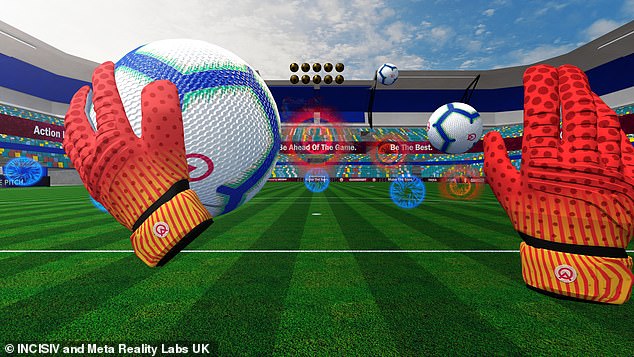
Users can play the game using a Meta Quest 3 headset and can download CleanSheet from the Meta Store
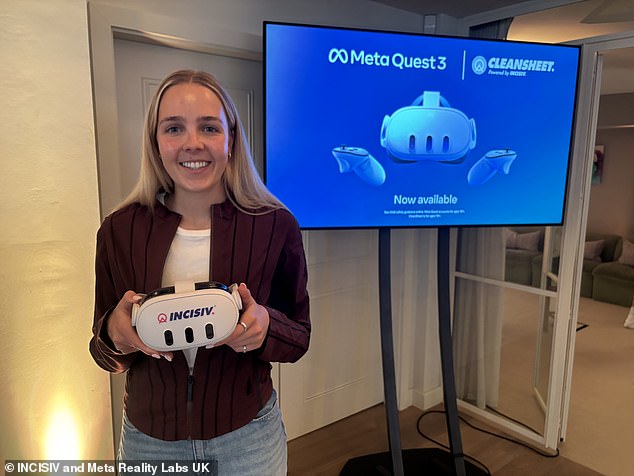
Barcelona and England star Ellie Roebuck tested the system at a showcase event last week
“Essentially, it’s about service. It’s about having quality service every time,” she explains.
Professor Craig is at the forefront of developing virtual reality software that allows athletes to hone their skills not only on the training field, but also at home, in the garden or wherever they have access to a Meta Quest 3.
Her software, CleanSheet – which can be downloaded from the Meta Store – is a football simulation that users can download onto their Meta Quest 3 and that allows players to test themselves in different game modes, recreating certain scenarios from a match.
In short, fans can put themselves in the position of taking on a James Ward-Prowse free-kick or a one-on-one match against Cristiano Ronaldo, in their own living room or backyard.
The software, developed by INCISIV, has also attracted the attention of a number of top players, with England and Barcelona goalkeeper Ellie Roebuck testing the game at an event last week.
Meanwhile, Union SG and Luxembourg international Anthony Moris is also using the technology to improve his skills.
And the benefits of this VR system are clearly visible. A user can improve their technique, fitness and reaction times while using the software.
“CleanSheet VR is all about giving goalkeepers the opportunity to get their 10,000 hours of training in at home, at an indoor facility or wherever they want,” said the Ulster University professor.
“What it does is simulate all different types of ball trajectories and shots on goal. And then what we can do is we can manipulate that. We can change the difficulty level. It can adapt to whoever the end user is.”
Professor Craig, CEO and co-founder of INCISIV, has previously conducted extensive research with elite clubs such as AC Milan. She also worked with adidas when the brand produced their iconic Predator boots and has used the research she gathered to develop CleanSheet.
Her curiosity about the way players like David Beckham add spin to the ball when taking a free kick led her to develop CleanSheet.
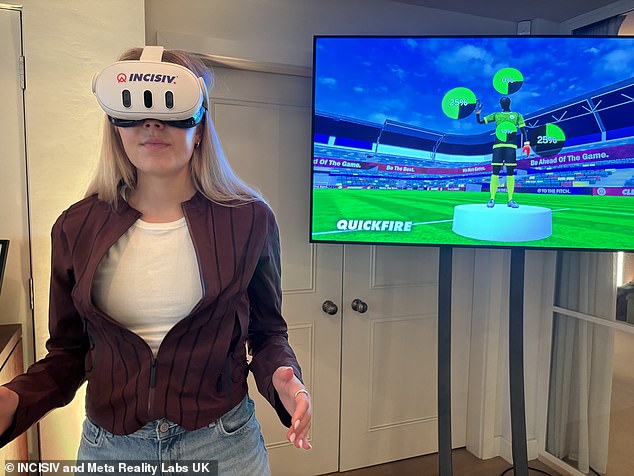
As Roebuck demonstrates, players can use the Meta Quest 3 to test their reactions and shot-stopping against top-level opponents and to work on their fitness
‘It was around the time of the 1998 World Cup and you had players like David Beckham and Roberto Carlos, all taking curved free kicks,’ she says. ‘As a psychologist I was curious as to why they were putting spin on the ball. Is a ball with spin harder to predict? And if so, why?
‘People often describe goalkeeping as very reactionary, and it is. But there’s also an anticipatory aspect to it that’s really important. So what happened then was that I needed a technology that would allow me to simulate different types of shots.’
Professor Craig reveals that it was there that she came across virtual reality. But at the time, the technology was, as she describes it, “extremely rudimentary”, with machines costing nearly €10,000 (£8,426).
But developments in virtual reality over the past 20 years have made the software more accessible. That means professional athletes, researchers, and anyone who just wants to experiment with systems like CleanSheet can now do so with the Meta Quest 3.
‘Then I had to test players. So we had different simulations of types of balls with spin, and that’s where a collaboration with adidas innovation team football came in.
‘They said to me, “Oh, we’re really interested in this,” because at the time they were making the predator boat. With that you could put more spin on the ball. So I was basically answering the question: if you can put spin on the ball, does that increase your chance of scoring? Because it’s harder for a goalkeeper to stop.’
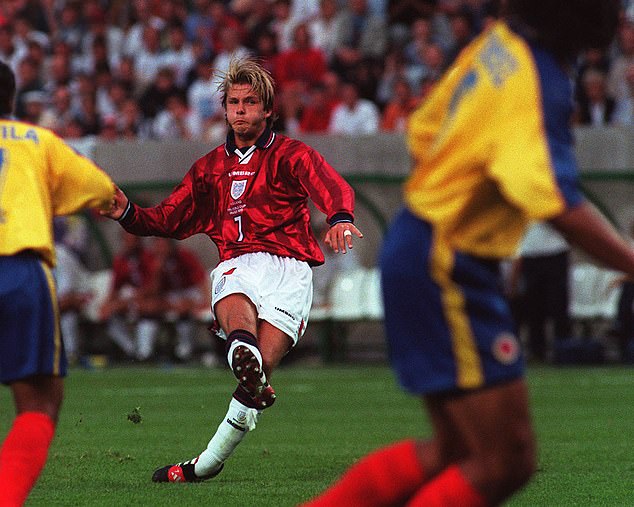
Professor Craig explains that her curiosity about the mechanics of how goalkeepers operate was sparked when she watched David Beckham’s (centre) free kicks during the 1998 World Cup.
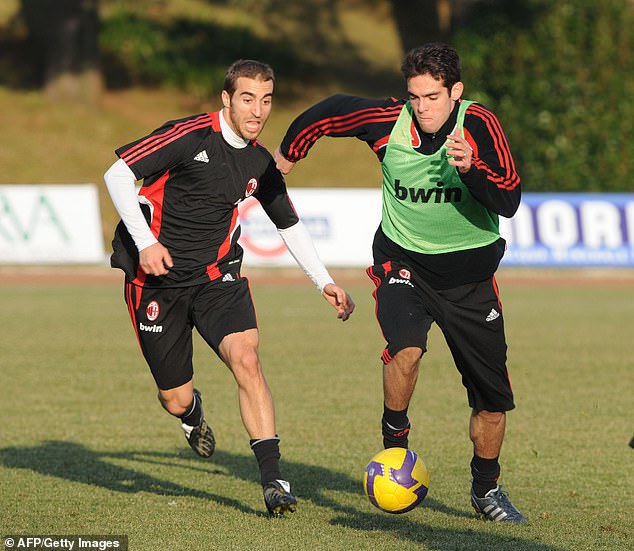
The researcher also spent some time at AC Milan studying how players like Kaka (right) move
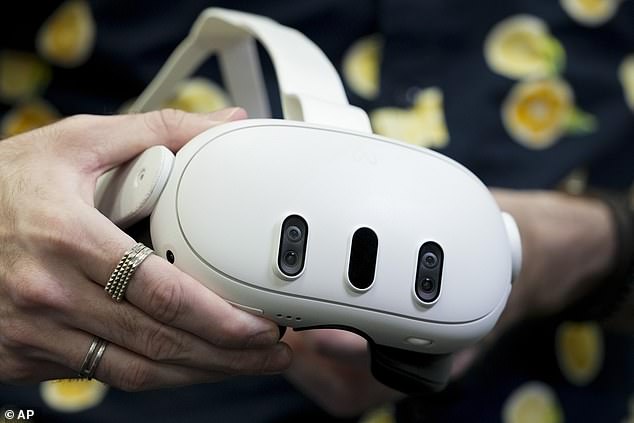
The technological advancements of Meta Quest 3 mean users can test their skills against top opponents from the comfort of their own home
She continues: ‘We went to AC Milan, Marseille, Schalke and Bayer Leverkusen and I was able to test the players there, like Kaka and Shevchenko – outfield players and goalkeepers – with this very simple headset of mine.’
Her findings provided her with a wealth of highly insightful data, allowing Professor Craig to expand his work into other sports, including golf and cricket, and even conduct research into Parkinson’s disease.
It also led her to develop CleanSheet, a virtual reality game that she believes can help coaches identify future talent, as the system uses detailed information to collect data on the flight of the ball, its speed and the position of the goalkeeper.
“This allows us to create points systems and rankings that are more based on, I guess, talent identification. So for me, it’s super exciting to know where these people are – wherever they are in the world – who really have talent.
‘I’ve often asked goalkeeper coaches, “How do you know this player is your best goalkeeper?” Where can they actually test them? What I can do is give them all the exact same test and measure how they perform. And that’s something you can’t do with any other technology.’
The game itself has been a huge success, with over 150,000 people using CleanSheet and that number continues to grow.
Professor Craig believes that mixed reality is the future of the sport and will allow players to ‘translate their skills from the virtual reality system’ onto the playing field. She hopes that in the future INCISIV can work with goalkeeping coaches to further develop the software.
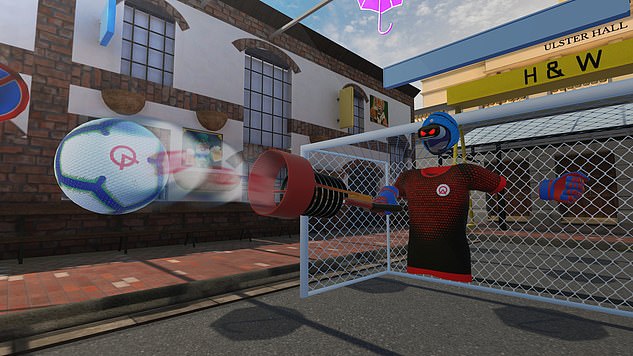
Professor Craig believes ‘mixed reality’ is the future of sport and will allow players to ‘translate their skills from the virtual reality system’ onto the playing field.
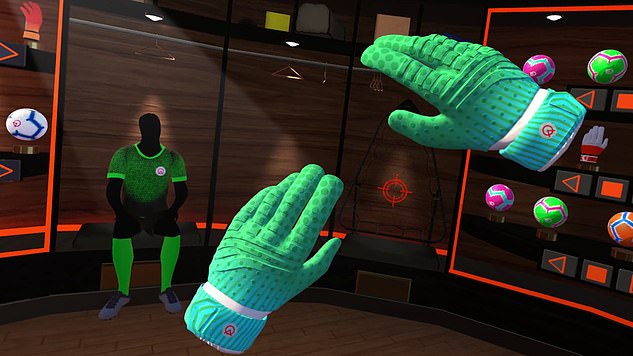
Craig also believes that virtual reality could change the way esports is played, with participants able to compete in arena-style events such as Gladiator
‘We want to work with progressive goalkeeping coaches who understand it and see the potential.
‘I get super excited when we go to an indoor 3G field and we use mixed reality because you can see the ground, you can see the post. But you have avatars shooting balls at you, you’re diving, you’re doing a lot of stuff.
“For me, mixed reality is the future of sports,” she adds.
Professor Craig also believes that virtual reality could change the way eSports is played, with competitors able to take part in arena-style events such as Gladiator.
“I would love it if esports consisted of everyone sitting in a virtual room, or in a room trying to make these saves [with] people in the arena cheer them on, [similar to] those reality TV shows where people try to go through that circuit and pick up the gauntlet. Kind of like that show Gladiator.’
You can download and test your goalkeeping skills with CleenSheet from the Meta Store here Today.
